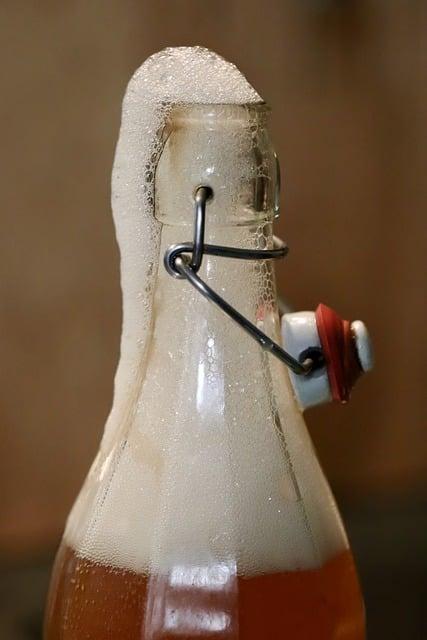Welcome to the world of "kombucha que es" – a drink shrouded in mystery and steeped in tradition. What exactly is this fizzy elixir that has taken the health world by storm? Join us on a journey as we unravel the secrets of kombucha and discover why it has captivated the taste buds and imaginations of so many. Let’s delve into the origins, the brewing process, the health benefits, and everything in between. Get ready to sip on knowledge and quench your curiosity about the enigmatic "kombucha que es.
Table of Contents
- Understanding Kombucha: Origins, Benefits, and Myths
- Mastering the Art of Brewing Kombucha at Home
- Q&A
- Concluding Remarks


Understanding Kombucha: Origins, Benefits, and Myths
In the world of fermented beverages, kombucha stands out as a beloved elixir with a history as intriguing as its tangy taste. This effervescent drink traces its roots back to ancient China, where it was revered for its potential health benefits. Today, kombucha continues to gain popularity worldwide, touted for its probiotic properties and unique flavor profiles.Benefits: Kombucha is believed to be rich in probiotics, which can support gut health and digestion. Additionally, it is a natural source of antioxidants, aiding in detoxification and promoting overall well-being. Despite its slightly acidic nature, many enthusiasts appreciate its refreshing taste and potential to boost energy levels. Myths: While kombucha has a devoted following, some misconceptions surround this fizzy beverage. One common myth is that it contains high levels of alcohol due to the fermentation process. In reality, commercially produced kombucha typically contains trace amounts of alcohol, well below the legal limit.


Mastering the Art of Brewing Kombucha at Home
Brewing kombucha at home is a delightful journey that allows you to experiment with flavors, textures, and fermentation techniques. As you delve into the world of kombucha-making, you’ll discover the art of balancing sweetness, acidity, and fizziness to create a perfectly harmonious brew.
**Key Tips for Brewing Kombucha at Home:**
- Start with high-quality tea and sugar to provide essential nutrients for the SCOBY.
- Ensure a clean brewing environment to prevent contamination and maintain a healthy fermentation process.
- Monitor the temperature of the brewing vessel to optimize fermentation speed and flavor development.
- Experiment with different fruit juices, herbs, and spices during the flavoring stage to create unique kombucha variations.
| Ingredient | Role |
|---|---|
| Tea | Provides nutrients for the SCOBY |
| Sugar | Feeds the fermentation process |
| SCOBY | Contains beneficial bacteria and yeast for fermentation |
Q&A
**Q&A: Demystifying Kombucha: What Is It Really?****Q: What exactly is kombucha and where does it come from?**
A: Kombucha is a fizzy, fermented tea beverage that originated in East Asia many centuries ago. It is made by fermenting sweetened tea with a SCOBY, which stands for symbiotic culture of bacteria and yeast.
**Q: What makes kombucha so popular?**
A: Kombucha has gained popularity due to its potential health benefits, including probiotics that support gut health. Many people enjoy kombucha for its tangy flavor and natural effervescence.
**Q: Is kombucha alcoholic?**
A: Kombucha naturally contains a small amount of alcohol, typically below 0.5% alcohol by volume. However, some varieties may have higher alcohol content, so it’s important to check the label if this is a concern.
**Q: Can you make kombucha at home?**
A: Absolutely! Making kombucha at home is a fun and cost-effective way to enjoy this beverage. All you need is a SCOBY, tea, sugar, water, and patience as you let the magic of fermentation work its wonders.
**Q: Are there any risks associated with drinking kombucha?**
A: While kombucha is generally safe for most people, it is slightly acidic and contains trace amounts of caffeine and alcohol. Individuals with compromised immune systems or certain health conditions should consult with their healthcare provider before consuming kombucha regularly.
**Q: How should kombucha be stored and consumed?**
A: Kombucha should be stored in a cool, dark place away from direct sunlight. It’s best enjoyed chilled, either straight from the bottle or over ice with your favorite garnishes like fresh fruit or herbs.
**Q: What are some creative ways to incorporate kombucha into recipes?**
A: Kombucha can be used in various recipes, such as salad dressings, marinades, cocktails, and even desserts like sorbets or popsicles. Get creative and experiment with different flavors to discover your favorite combinations!
